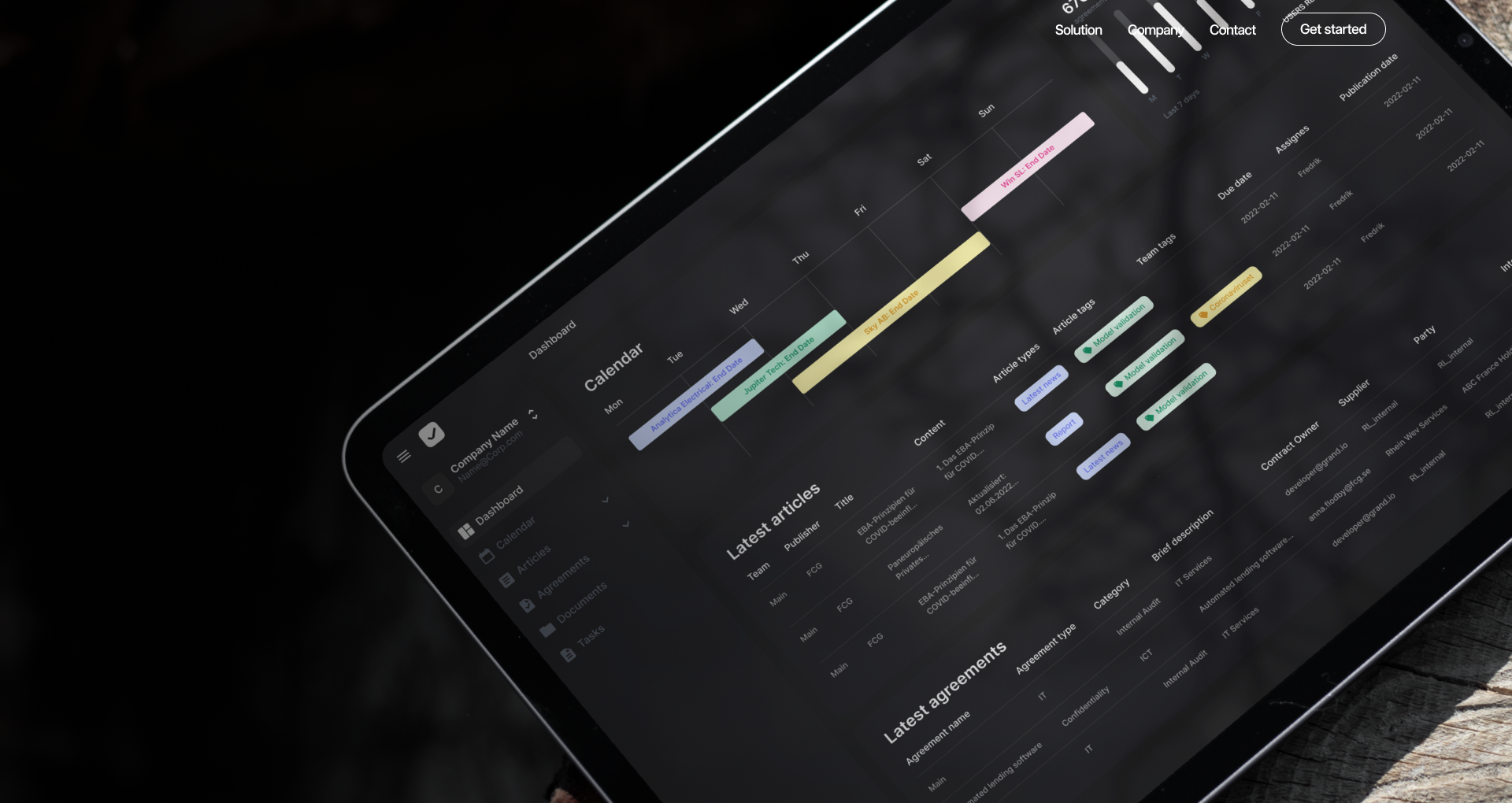GRC Software: how AI improves compliance management?
The discussion highlights AI’s evolution as a strategic asset in GRC frameworks. It underscores the necessity of structured AI strategies for balancing risk management with innovation and adapting to regulatory changes, emphasising AI's significance in modern business environments.

By strengthening regulatory content and change management, artificial intelligence (AI) dramatically enhances compliance management using GRC (Governance, Risk, and Compliance) software. It effectively examines a range of rules, finding similarities and simplifying compliance procedures [1]. This reduces the workload for IT personnel and saves a significant amount of money and time [1]. AI in GRC software enables increased organizational agility and frees up time for firms to concentrate on strategic planning by automating many repetitive processes [1]. As a result, AI is essential to the development and effectiveness of GRC software as well as compliance management in general [1].
Source
[1]

GRC Software and AI Compliance in Today's Business Environment
Companies all throughout the world are coming to understand how important GRC is to maintaining corporate integrity, accomplishing strategic objectives, and guaranteeing sustainability and security in their operations. Significant investments in GRC frameworks, which are thought to be crucial for the prosperity and health of enterprises, are being driven by this increased understanding.
The integration of new technologies, especially Artificial Intelligence (AI) with sophisticated GRC software, is at the core of the fast changing GRC landscape. These innovations redefine the efficacy and efficiency of GRC procedures; they are far more than just incremental improvements. Using top-notch GRC software has become a crucial tactic in a company environment full of obstacles, from the requirement for expedited compliance procedures to the management of complicated risks.
The move in GRC toward technology-based solutions is a calculated reaction to the more intricate corporate environment. New and changing hazards are brought about by the effects of climate change, geopolitical unrest, and global health issues. As a result, companies are actively looking for ways to manage these risks efficiently, which emphasizes the critical role that sophisticated GRC software and AI-driven compliance tools play.
Adoption of these tech solutions is about capitalizing on possibilities to succeed in a volatile market, not only about traditional risk management. In particular, AI-driven compliance solutions are changing the game. Because of their ability to analyze massive amounts of data and provide insights almost instantly, businesses are better able to anticipate patterns, foresee events, and respond quickly and strategically.
Furthermore, the introduction of preventive, predictive, and diagnostic tactics by AI is revolutionizing the GRC arena. This invention significantly improves how businesses operate, which increases resilience and makes them more able to prosper in unstable market conditions.
Governance, Risk, and Compliance: The Power of AI Compliance Software
An important factor in the transformation of Governance, Risk, and Compliance (GRC) is artificial intelligence (AI). Leading this shift are GRC and AI compliance tools, which provide creative answers to challenging problems. Businesses must make this change in order to prosper in the fast-paced world of today.
Key Transformations Brought by AI in GRC:
- Enhanced Decision-Making:
- Deep insights into operational risks and regulatory requirements are provided by AI-powered GRC software.
- Large data sets may be analyzed quickly and accurately to find trends and anticipate dangers thanks to advanced algorithms and machine learning.
- Proactive risk management depends on this predictive ability, which enables companies to identify and mitigate hazards before they become serious.
- Streamlined Compliance Processes:
- Artificial Intelligence-driven GRC software is revolutionary in highly regulated industries such as finance and healthcare.
- These instruments effectively traverse intricate regulatory environments, guaranteeing uninterrupted adherence.
- Routine task automation lowers the possibility of human error, simplifies processes, and frees up resources for long-term plans.
- Enhancing Cybersecurity:
- Artificial Intelligence greatly enhances cybersecurity in GRC systems.
- Sensitive data protection requires real-time monitoring and advanced threat detection.
- Maintaining regulatory compliance and preventing data breaches are two reasons why this component is so crucial.
- Changing Audit Management:
- AI gives audit management previously unheard-of intelligence and efficiency.
- AI technologies decrease associated time and costs by streamlining audit processes and focusing on high-risk areas.
- Through the identification of anomalies and questionable trends in massive data sets, machine learning algorithms enhance fraud detection.
The ability of businesses to ensure strong governance and compliance in a complex and evolving business environment is being redefined by the revolutionary influence of AI on numerous GRC components, from cybersecurity and audit management to decision-making and compliance processes.

GRC with AI: Diverse Applications for Enhanced Compliance and Risk Management
AI and risk management: AI is changing the face of risk management. AI-driven GRC software provides vital insights for efficient risk mitigation by processing and analyzing large data volumes quickly. These insights are crucial for creating risk assessment models that are more accurate, which is a big benefit for financial institutions and companies who want to successfully mitigate risks. Artificial intelligence (AI) tools are very good at finding patterns of risk and coming up with strong management plans, which raises the bar for risk management procedures.
AI's Effect on Management of Regulatory Compliance: The ever-changing landscape of regulatory compliance poses ongoing hurdles for businesses. Algorithms for machine learning and artificial intelligence here become revolutionary. By automating compliance tests, strengthening continuous control monitoring, and improving data governance, they greatly lower the risk of non-compliance. AI-powered solutions' real-time insights and predictive analytics are essential for handling compliance-related concerns more successfully and efficiently.
AI's Role in Cyber Risk and Compliance: The Function of AI in Cyber Risk and Compliance The use of AI is becoming more and more important in the field of cyber GRC. Artificial intelligence (AI)-enhanced cyber risk management systems are crucial for enhancing defense capabilities as cyber attacks continue to escalate in sophistication and frequency. AI-provided real-time monitoring and advanced threat identification provide prompt and efficient reactions to security threats.
AI-Powered Audit Management: AI gives audit management previously unheard-of intelligence and efficiency. AI solutions drastically cut down on the time and resources typically required for audits by focusing on high-risk regions and optimizing audit procedures. In order to improve fraud detection and audit process integrity, machine learning algorithms are essential for spotting abnormalities and suspicious trends in big datasets.
LLMs and Generative AI GRC Transformation: The future of GRC is changing with the introduction of generative AI and Large Language Models (LLMs) like ChatGPT. These tools are extremely useful for a variety of activities, such as creating intelligent reports, compiling risk assessments, and creating plans to reduce fraud. Their ability to manage intricate data and provide useful, actionable insights ushers in a new era of GRC tactics.

Harnessing AI and Machine Learning to Advance GRC Frameworks
Machine Learning in GRC Software:
- Learning and Changing Capabilities: Machine learning is a dynamic tool for GRC because of its exceptional capacity to learn from data over time.
- Comprehensive Risk Insights and Compliance Management: Machine learning (ML) analyzes large datasets to find complex patterns and anomalies that provide deep insights into compliance and risk management tactics. This in-depth analytical capacity is essential for developing proactive and flexible GRC strategies.
Enhancing Decision-Making with AI and ML:
- Thorough Knowledge of Risks and Compliance: Artificial intelligence (AI) and machine learning (ML) offer a comprehensive understanding of risks and compliance needs, enabling well-informed and strategic decision-making.
- Utilizing Predictive Analytics to Develop Future-Ready Plans: These technologies are quite good at predicting future trends and hazards, giving organizations the ability to anticipate problems and take proactive measures to resolve them.
Automating Compliance and Risk Management:
- Streamlining Operations: By greatly automating crucial risk management and compliance procedures, AI and ML improve operational effectiveness.
- Minimizing Human Error and Optimizing Resources: By eliminating a large amount of manual labor, this automation lowers the risk of error and frees up teams to concentrate on key business operations and important projects.
Real-time Data Processing and Analysis:
- Quick Risk Identification and Response: Quick risk identification and compliance monitoring enable timely reactions to new threats and regulatory changes. This is made possible by the capacity to process and analyze data in real-time.
- Dynamic and Adaptive GRC Strategies: GRC strategies are particularly relevant and effective because they are continually aligned with the most recent business environment and regulatory advancements thanks to continuous real-time analytics.
Adapting to Evolving GRC Challenges:
- Inherent Flexibility for a Changing World: AI and ML are well-suited to handle evolving hazards and shifting regulatory requirements due to their inherent flexibility and scalability.
- Building Resilient and Compliant Organizations: In a quickly changing global business environment, firms need to be able to adapt in order to retain compliance and resilience.
The Pivotal Role of AI and ML in ModernGRC Solutions
One of the main components of the modernization of Governance, Risk, and Compliance (GRC) solutions is the use of Artificial Intelligence (AI) and Machine Learning (ML). Businesses can greatly improve their compliance and risk management strategies by utilizing the potential of these technologies.
AI in Fraud Detection and Risk Mitigation: The fields of fraud detection and risk mitigation are among the most important uses of AI and ML in GRC solutions. Artificial intelligence (AI) can analyze large datasets more effectively than humans, which makes it possible to identify intricate patterns and trends. This is crucial for identifying possible hazards and fraud, giving GRC specialists the resources they need to effectively anticipate and mitigate risks.
Transformative Automation in Compliance Monitoring: AI and ML significantly improve compliance monitoring, a difficult GRC task because of the constantly shifting regulatory environment. These technologies make guarantee that organizations quickly adjust to changes in regulations and stay compliant by automating the tracking of those changes. The operational efficiency and compliance standards are greatly enhanced by the automation of these operations.
AI-Powered Regulatory Reporting: AI is also revolutionizing the once labor- and time-intensive process of regulatory reporting. AI-driven solutions reduce the need for significant human interaction by enabling more accurate and efficient compliance reporting. In addition to streamlining the reporting procedure, this frees up GRC specialists to concentrate on risk management and strategic governance duties.
Prediction Analytics in Risk Assessment: AI and ML's prediction powers are essential for risk assessment. Instead of using traditional reactive models, these technologies allow firms to proactively detect and manage potential hazards.
AI in Policy Management: AI plays a key role in helping organizations match their policies with changing legal requirements. It helps with ongoing compliance monitoring, making sure that regulations reflect the most recent regulatory environment. This skill is essential for reducing legal risks and ensuring ongoing compliance.
Overcoming Challenges in AI and GRC Integration
Businesses can undergo a radical shift with the incorporation of Artificial Intelligence (AI) and Machine Learning (ML) into Governance, Risk, and Compliance (GRC) software. To effectively utilize AI and ML's potential in GRC processes, however, the following particular issues posed by this integration must be addressed:
- Data Quality and Volume Challenges:
- Quality Data is Important: The number and quality of data are critical to AI's efficacy in GRC. Access to adequate and high-quality data is necessary for accurate AI-driven insights.
- Difficulties with Data Collection: Organizations frequently face difficulties collecting high-quality, pertinent data, particularly in GRC when data is dispersed and heterogeneous.
- Integration with Legacy Systems:
- Complex Integration Processes: One of the biggest challenges is integrating AI seamlessly into the numerous legacy systems that are currently in place.
- Technology Disparities: Different systems' varying degrees of technology development can make it difficult to apply AI effectively in GRC procedures.
- Security, Privacy, and Ethical Concerns:
- Regulation Compliance: When using AI to manage sensitive data, compliance with strict rules like GDPR and HIPAA is essential.
- Taking Care of Bias and Ethics: AI systems may display biases resulting from algorithms or training data. Maintaining public trust and ensuring ethical AI deployment requires a careful approach.
- Continual Adaptation and Refinement:
- Changing GRC Environment: As new laws and hazards appear, the GRC field is always evolving.
- Frequent Updates Are Required: AI and ML models must be continuously monitored and updated in order to remain current and useful.
- Technological Disparities and Informational Gaps:
- Harmonizing Different Systems: Bridging the gap between the GRC system and other organizational systems is necessary for integrating AI into GRC frameworks.
- Overcoming Implementation Challenges: In order to prevent information gaps and increase the efficacy of AI in GRC, it is imperative that these technology differences be addressed.
By addressing these issues strategically, businesses can fully utilize AI and ML, converting existing GRC procedures into more sophisticated, responsive, and effective systems.
Maximising the Potential of AI in GRC
The incorporation of Artificial Intelligence (AI) into corporate technology, specifically in the context of Governance, Risk, and Compliance (GRC) systems, offers a multifaceted environment replete with opportunities as well as obstacles. A comprehensive grasp of AI's advantages and disadvantages is necessary for navigating this environment, as is strategic management to optimize AI's benefits.
Managing AI's Power with Prudent Management: AI's biggest asset and possible drawback is its capacity to bring about major change with little human intervention. Due to this duality, a balanced strategy is required to ensure the responsible and efficient application of AI. Businesses that want to appropriately integrate AI must invest in infrastructure and training to prevent unintended consequences from misuse or inexperience.
Handling Data Security and Privacy Issues: Because AI depends so heavily on data, data security and user privacy are major concerns. Stricter data standards, such as GDPR, must be followed in order to avoid breaches that could seriously harm one's finances and reputation. Strong data security protocols must be ensured before implementing AI in GRC.
Reducing Prejudice and Guaranteeing Ethical Application of AI: AI programs may unintentionally reinforce prejudices seen in training sets. Fair and impartial AI solutions must be developed in order to prevent discriminatory results. This entails putting in place accountable and transparent AI systems with ethical and comprehensible decision-making procedures.
Legal and Regulatory Compliance: The laws governing the usage of AI are complicated and constantly changing. A number of legal considerations must be navigated in order to determine culpability in situations when AI systems do harm, including supply chain integrity and the possibility of unintentional usage. One of the most important things for people employing AI in GRC is compliance with newly evolving rules.
Creating a complete AI Strategy: In order to fully utilize AI's potential in GRC, a complete strategy that takes social, legal, ethical, and technical factors into account must be developed. This plan should be in line with the entire governance structure, guaranteeing that AI is applied to improve GRC procedures while controlling related risks.
Cooperation with Regulators and Policymakers: Working with regulators and policymakers is essential as artificial intelligence is increasingly incorporated into corporate processes. This partnership can aid in the development of fair laws that encourage creativity while addressing the hazards related to artificial intelligence.
Governance, Risk, and Compliance: AI as a Strategic Imperative
Key Insights:
- Transition from Tactical Tool to Strategic Asset in GRC:
- AI in GRC has developed into more than just a technical instrument. It currently serves as a key component of the internal strategy.
- Artificial Intelligence (AI) is a crucial tool for navigating the complicated corporate world of today. It is a cornerstone for effective governance, risk identification, and management because of its capacity to analyze large amounts of data, predict future trends, and automate difficult procedures.
- This tactical modification highlights how AI may improve decision-making processes' accuracy and effectiveness, enabling companies to quickly adjust to changes in the market and comply with regulations.
- Comprehensive GRC Strategy with AI Integration:
- It is now essential to have a systematic AI strategy within GRC frameworks rather than a choice.
- A strategy like this needs to include every aspect of AI, from its design and lifecycle to its ethical implications and compliance with laws.
- The strategy should strike a balance between technological mastery and comprehension of the moral, legal, and governance issues, guaranteeing that the integration of AI improves not just productivity but also strategic planning and decision-making.
- The thorough incorporation of AI into GRC highlights the necessity for companies to be adaptable and quick-thinking in order to successfully manage the intricacies of international risks and regulatory environments.
- AI: Balancing Risk Management with Value Creation:
- When used effectively, AI in GRC goes beyond conventional risk management, providing the twin benefits of risk management and opening up new opportunities for innovation and value generation.
- Businesses may improve risk management techniques, guarantee strict compliance, and fend off possible dangers by implementing AI.
- AI also makes it easier for organizations to grow and innovate by enabling them to use data to get a competitive edge and strategic insights.
- This balance between value creation and risk reduction highlights how AI is transforming GRC and makes it an essential tool for companies hoping to prosper in the digital era.
Reduce your
compliance risks


